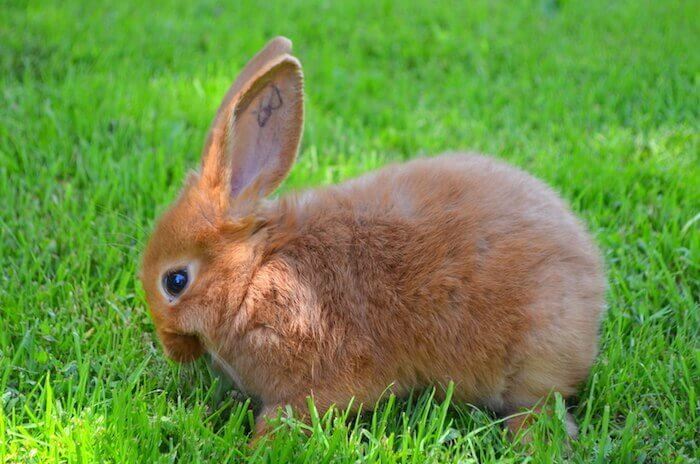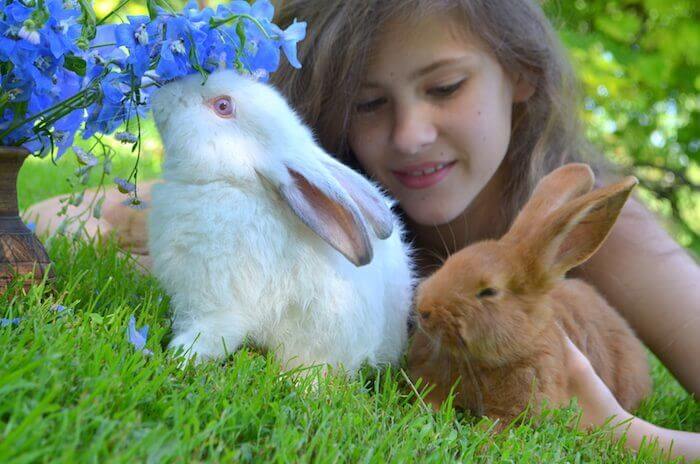What is a New Zeland Rabbit?
Despite their name, New Zealand Rabbits are actually an American rabbit breed from California that were developed in the early years of the 20th century. According to some sources, they were bred from a group of rabbits imported from New Zealand, but it is more likely that they are the result of crossing various meat rabbit breeds. Likely ancestors include the Belgian Hare and Flemish Giant.
Over the last 100 years the New Zealand has been bred for size and to a lesser extent for color. There are both meat ‘production’ lines as well as show lines, but all New Zealand rabbits share a few key characteristics. They are 10 lbs to 12 lbs (5 kg) on average, and the males (bucks) are slightly smaller on average than females (does). They are known as good mothers and are fast to mature. White tends to be the most common color in commercial meat lines, but red was the original breed color. Black and ‘broken’ (red or black with white patches) are also acceptable colors.

New Zealand Rabbit Characteristics
- Short fur that can be white, black, ‘broken’, or various shades of red
- Are large and fast-growing
- Have large, upright ears
- Are an easy-going and quiet breed
- Popular among show rabbit circles due to their easy-going personalities
Feeding and Care
Because New Zealands are large, fast-growing rabbits with a tendency to gain weight quickly, there are a few things to keep in mind when raising these rabbits as pets.
Housing
According to the House Rabbit Society, all rabbits need an enclosure to be at least 4 to 6 times the size of the rabbit when it is stretched out. Keep in mind, if you are getting a young rabbit, that this rough dimension should be based on the rabbit’s adult size. If they will be spending all day in their cage, it should probably be even larger. An eight square foot (.75 meters squared) enclosure is recommended, and your rabbit should also have time to play outside of their home every day.

Diet
When raised as pets, another factor to consider is diet. Big rabbits will obviously eat more than smaller breeds, and because New Zealand rabbits have been specially bred over the years to put on lots of weight quickly, special attention should be given to the food they are offered. They should be offered a measured quantity of high-quality rabbit pellet and unlimited timothy hay every day. They can be given leafy vegetables daily, and occasionally can be given special treats like fruit or carrots. More information on basic rabbit dietary requirements can be found here.
Additional Care Requirements
- A rabbit’s teeth grow constantly, and they should be provided with objects to chew on
- Rabbits should be brushed once a week
- Rabbits are social animals, need daily attention, and may benefit from having a companion
- New Zealands can live for 5-8 years if well cared for
More on Rabbits
Special Concerns
As a breed New Zealand rabbits are relatively healthy and vigorous and so they are generally healthy pets, but there are some things to keep in mind if you are planning on keeping a New Zealand rabbit. Overfeeding can be a big issue for New Zealand rabbits because they are bred to grow to a large size. Too many treats can cause these rabbits to become overweight and can shorten their lifespan. This is especially true of New Zealands that come from ‘production’ lines. New Zealand rabbits can also suffer from infrequent genetic disorders. One such defect causes some rabbits to develop cataracts. It’s important to know, however, that genetic diseases are comparatively rare in this breed, and are avoidable if you plan to buy your rabbit from a reputable breeder.
Another thing to keep in mind when choosing a large breed like the New Zealand is where it will be housed. New Zealand rabbits need more space than small rabbit breeds and benefit from daily exercise outside of their cage to help keep them at a good weight. Like all rabbits, New Zealand rabbits are sensitive to heat, and although they can be kept outside in a hutch, it is best to keep them inside where they can benefit from a steady temperature and will get more attention.
Are they good pets?
So do New Zealand rabbits make good pets? Despite being originally developed as a meat rabbit, New Zealands make great pets! They enjoy being part of a family due to their social nature and do well with children and other pets. Because of their calm temperament, they can be housed together with other rabbits, but be sure that each rabbit has enough space to prevent bickering. New Zealand rabbits are an especially good choice for anyone who is new to rabbits or for homes with children. Because they are big, they are not as delicate as small breeds, and their hardiness makes them easy to care for. Their short fur requires no special grooming unlike long-haired breeds, and they have very few breed specific diseases.
Sources:
crossroadsrabbitry.com
justrabbits.com
rabbit.org
Reviewed By: Tim Winter

Tim Winter has a strong affection for pets and wildlife. His years of experience caring for various types of pets has led him to share his knowledge with others on the best practices in pet care. Tim holds a Bachelor of Science from the University of Oregon School of Journalism and Communications.

We have a 4 month old New Zealand and he is very good usually but has started urinating anywhere he pleases in or out of cage. We are getting him neutered in a few months (earliest we could get an appointment) and hope this helps. Any other suggestions.
Mine was rescued from a farm where he lived with poultry. They rehomed him because he was aggressive to the birds. I think he found them irritating. He’s fine with our small dog and two cats. He did early on teach them to give him space. He just hopped right at them until they had to get out of his way. Now everyone is fine and they can be near each other peacefully because the other pets don’t mess with him. He does want to be with the family. He doesn’t like long periods on his own. He has his own large area with a fence they all can get through open to the house but with three walls and a house he can get inside. We have taught the dog to stay out though. It seems important that he can be out at will but has a retreat he can go to and relax. He does have rabbit tantrums knocking everything over at times. Usually his pellets have run low or he hasn’t had greens in a couple days or we haven’t sat with him giving him lots of petting in what he considers too long. Yours might just feel anxious or irritated. Who knows what your bun has been through. He probably just needs settle in time. Good luck
i rescued a new zealand rabbit about 2-3 months ago. he was found on the side of a busy road and the vet and pet shop tried to find his owner but couldn’t. The owner of this pet shop, named him Beefcakes (new friend) knew i loved animals and thought i would be a perfect match for this bunny so she gave him to me. he’s been with me for a few months now has his own room toys little everything he would need, but he seems grumpy. he is very territorial, he beats the cats up and chases the dog. the rabbit is 10lbs the cats about 7-9 lbs and a 80lb dog. so big or small he doesn’t care he fights every one. i dont know what to do i can not and will dont re-home him as he was going to be put to sleep if i didnt take him. any ideas on what to do?
Maybe try getting him neutered
I have just gotten a white new Zealand rabbit on Easter and she was just being weaned and I know nothing of proper care for them or if any immigrations are needed and she has been in the house since Easter like a little dog and we are attached and love her so much.
I’m my honest opinion I know you are very attached to your rabbit, but since it was an Easter bunny, however, they have a real reputation for being sold too young or people get the wrong info about them from the sellers so I would definitely do my research on things like ; what breed it is, diet, housing, common genetic diseases/disorders, grooming, etc. caring for rabbits is a lot harder than it looks and though it is possible to keep them as a child’s pet, it is definitely NOT ideal for ANY breed. A rabbit is definitely an adult/teen pet due to the care and behaviors of the rabbit. They are timid yet social and their owners and caretakers usually have to have an understanding of their behaviors to form a real bond and keep the rabbit feeling safe and comfortable. (Also I would get her spayed as soon as possible by your vet. It prevents uterine cancer and stops the possibility of an accidental pregnancy)